Sue Fortin's Blog
November 10, 2023
10 Years, 16 Books, 5 Novellas, 3 Pen Names and Here’s What I’ve Learnt
I meant to post last month but was busy with my edits so didn’t have time. October saw me reach my ten-year anniversary as a published author. It was also kind of eleven years as I had independently published the year before, but in 2013 the book was picked up by Harper Impulse, now One More Chapter.
That book was “United States of Love” and was a contemporary romance. I went on to publish nine more books with Harper Collins, each one moving more into the romantic suspense and psychological thriller arena. Two of those books hit the Number 1 spot in the UK Kindle Chart.
I then had a switch of genre and a new pen name with “The Forgotten Life of Arthur Pettinger” and have published five books in total in historical fiction, with “All That We Have Lost” winning the RNA Jackie Collins Romantic Thriller Award. I’ve also independently published two books in a cosy crime series and published several romances under a pen name.
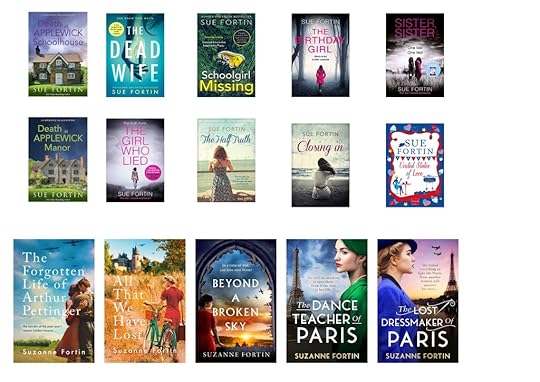
Of course, all these things are just the high points of my career to date. There have been many low points, some of which have involved tears and, if I’m honest, one period of time nearly broke me. I seriously considered walking away from writing and it was my independently published books that saved me and kept me sane. They still do. I get a great deal of joy and satisfaction from the Applewick Village Mystery series and absolutely love writing them.
So, what have I learnt from all this? Far more than a quick blog post could do justice, but here are my top ten – one for every published year.
Although writing is a solitary job, I didn’t get here on my own, there is a whole raft of people who helped which include – my family, my friends, my agents, my editors, my publishers, book bloggers, the writing community and my readers. I’ve made some wonderful friends along the way and some really are on my best friends list.
So, what of the next 10 years? I hope I’m still here writing, that I’ve added some more notable achievements to my CV and readers are still enjoying my books.
July 10, 2023
Publication Day – The Lost Dressmaker of Paris
I’m delighted that today is publication day for The Lost Dressmaker of Paris. It’s available in ebook, paperback and audio, the latter narrated by the fabulous Imogen Church.
The Lost Dressmaker of Paris has been great fun to write, especially as it centres around one of the things I love to do when I get the time – sewing. My maternal grandmother was a seamstress in London and I think I must have inherited, not necessarily her skills (they were immense) but certainly her affinity with sewing. I’ll be talking about my grandmother’s time as a seamstress and pattern drafter a bit more in my newsletter, so do please sign up if you haven’t already. I offer lots of extra content, short stories, bonus epilogues, behind the scenes, what I’m up to and sneak previews to newsletter subscribers. It’s all GPD regulated, your details are not shared with anyone else and I don’t spam you with unnecessary emails either. Click the newsletter link at the top of this page – look forward to seeing you there!
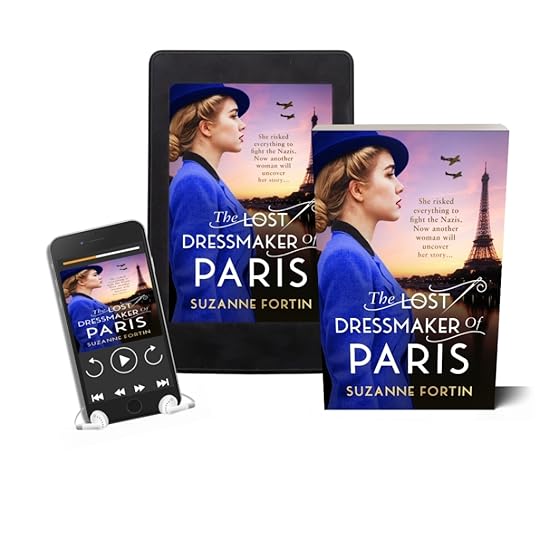
April 7, 2023
Eva Glyn – Guest Post
I was wandering down a research rabbit hole for The Olive Grove when I found it. It’s the sort of thing I think we all do; I needed the name of a small island which could be seen from a character’s house. The island was for sale. It had been for years. Now why could that be? I expect you get the picture.
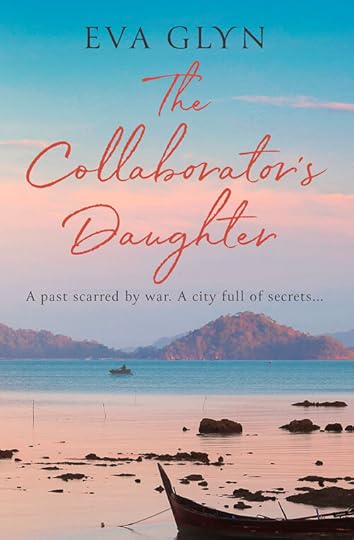
A little more digging and I discovered it was the place fifty or so men accused of collaboration with the Nazi occupiers had been executed by Tito’s partisans in 1944. Recognising its potential, I bookmarked it and moved on.
But it niggled me. There had hardly been due legal process, and rumours abounded that it was also a culling of political opponents, because hard as they had fought for their country, there was no guarantee of the partisans gaining power after the end of the war. Also intriguing were reports that the island was haunted so no-one would go there. It was all adding up to a story.
Or at least, a backstory. For a long time I had wanted to write a romance with protagonists in their sixties so my idea was that Fran would go back to Dubrovnik, the city of her birth, to try to find out what happened to her father Branko during the war. I’d give him a prologue to set the scene, and that would be more or less that.
But Branko had other ideas, insisting his story had to be told. And that was where I began to hit problems, because there are very few records of Dubrovnik during the Second World War, as much was destroyed during the communist era. I had stumbled across a paragraph or two when I was researching An Island of Secrets, because some of the British officers who served with the partisans on the island of Vis ended up there at about the time of the executions. They were immediately incarcerated in the Imperial Hotel, before being released a few days later to great apologies. From what I could make out, the timing matched with the executions.
It was immensely frustrating, because if I wanted to write a dual timeline I needed to know what life in Dubrovnik under occupation had been like for ordinary people and there were so few sources. I could not even find out how the partisans had taken the city. Until I discovered a letter written by a partisan officer to his commander and I knew. Translated into English, it was the only contemporary source I had.
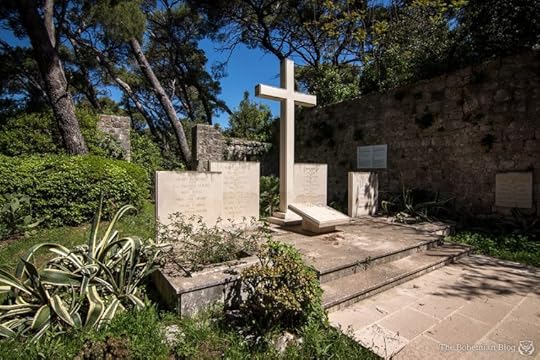
There was clearly not enough information for the book to be a full dual timeline but I scraped together what I had from the letter, from Jewish sources, British military historians and from the archaeological dig in 2009 when the men’s bodies were recovered from their mass graves, identified using DNA, and reburied with proper ceremony. I had enough for a short chapter from Branko’s point of view between each longer one from Fran’s.
And did I manage to get to Daksa myself? Of course not. It is only a few hundred yards from the coast near Dubrovnik’s main commercial port but my local friend – who is a tour guide and knows everyone – failed to find a boatman to take me. And when I asked myself I was met by a shake of a head, or an incredulous look. So in the end I decided it was best to leave these men, collaborators or otherwise, to rest in peace.
The Collaborator’s Daughter was published this week and you can buy it here.
To find out more about Eva Glyn and her books click here
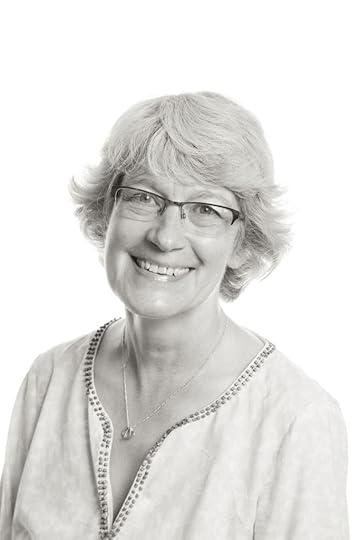 To find out more about Eva Glyn and her books click here
To find out more about Eva Glyn and her books click here
July 5, 2021
Visit Brittany via TripFiction
Just linking here a piece I wrote for TripFiction about my research in Brittany, France for The Forgotten Life of Arthur Pettinger. https://www.tripfiction.com/suzanne-fortin-brittany/
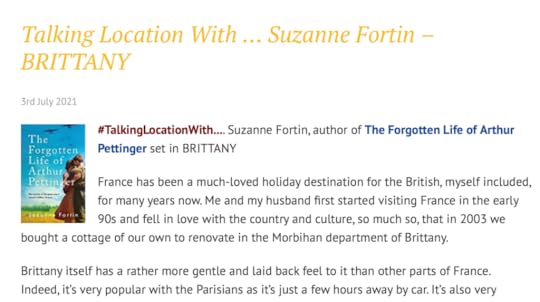
October 6, 2020
Exciting Book Deal News!
Say hello to Suzanne Fortin – yes, that’s me!
I’m delighted to be able to finally share the news that I have signed a three book deal with ARIA FICTION writing dual timeline women’s fiction novels as Suzanne Fortin. THE FORGOTTEN LIFE OF ARTHUR PETTINGER will be released in ebook on 4 March and paperback in June. You can preorder by clicking on the link HERE. I’m especially pleased about this book as it’s one that is close to my heart and something I’ve wanted to write for several years but had to wait for the right time.
Here’s a quick blurb to the story – you can read the full on Amazon.
The Forgotten Life of Arthur Pettinger is set in the present and during World War Two, and follows Maddie, who moves home to look after her grandfather when he develops Alzheimer’s where he fixates on his life during the war. When a video of him asking about a woman he knew during the war goes viral, Maddie begins to uncover a life she never knew her grandfather had lived.
[image error]
I’m still going to be writing mystery and suspense under Sue Fortin but we felt there needed to be a clear distinction between the two genres while still maintaining a connection, hence the new name.
On the technical side of writing under two different names, I’m going to being keeping the same social media as it will be easier to manage both writing names under one roof, especially as the names are very similar so you can follow all my writing news from one place.
March 24, 2020
Eleanor Harkstead : The Dangerous Path in Romance
[image error]
Eleanor has co-written The Colour of Mermaids with Catherine Curzon. [image error]
Romance and romantic suspense comes in many forms, not just the hearts and flowers relationships but the toxic and damaging ones too, how would you describe the romance included within your novels?
The Colour of Mermaidsand The Man in Room 423are about relationships between people who start off as strangers to each other. Both novels explore that “should I, shouldn’t I?” moment when a woman is faced with the choice of being intimate with a man she’s only just met. The novels ask, too, “How well can I ever know my partner?” So although the relationships aren’t toxic, they’re not hearts and flowers — at least not to begin with.
Our m/m romantic suspense, which will be out in a few months’ time, contains a rather more hearts and flowers romance. It’s called The Reluctant Royal and is about a royal bodyguard and the man he’s protecting. Risk and suspense come from outside the novel’s central relationship. The couple aren’t strangers, but are forced to live in close quarters. Faced with their mutual attraction, and peril all around them, it should be no surprise that romance blossoms.
Is it as straightforward as calling it romance?
I think it’s important to flag up the suspense elements in the stories because for some romance readers, risk and peril might not be their cup of tea. For fans of the genre, though, that’s the appeal: a story that combines suspense as well as romance. It’s romance with bells on! And of course, having romancein the title suggests the ending will be a happy ever after, or at least a happy for now. But it’s a dangerous path to the finish line.
What is it about romantic suspense that draws you to write it or include it in your books?
We write romance without suspense, too (we’ve written historicals, romcoms, gothics, you name it!), but it’s fun to write suspense sometimes because you’re laying out clues, building tension, creating and resolving a mystery. Of course, a story that doesn’t have suspense elements needs tension and often clues that lead towards some sort of truth that the protagonists are reaching for, but suspense and crime push those aspects of storytelling to the foreground.
What sort of balance between the romance element and the suspense element do you have?
We have about an equal balance between the two. I suppose the difference between romantic suspense and a straightforward crime novel is that romance is an important strand in the story. Crime novels can have romantic elements — many of them have sensual scenes, or implied ones, but it can’t be a major theme. I’ve heard crime readers complain if they discover too much relationship business in novels sold as a straight crime novel. They want bad deeds and someone to resolve them, but romance only as a side dish, if at all.
But the thing is that a lot of crime fiction doescontain romance, of a kind. It is, after all, part of being human. Even in classic crime fiction like the Maigret novels, Maigret’s wife and their relationship is important to the stories because she anchors him in a “normal” world, while his job as a detective takes him to dark places.
Do you come up against any regular misconceptions about the genre and how do you dispel these?
I’m sure other romantic suspense authors will say the same, but there’s an assumption that the romance element in romantic suspense distracts from the suspense and makes them less crime-y, and not to be taken all that seriously.
It’s a shame, because a great deal of care is required when plotting and writing romantic suspense. You have to maintain the balance between solving the mystery and developing the protagonists’ relationship, and I personally like the kind of romantic suspense that casts doubt on the person the protagonist is on the verge of falling in love with. So you have to show whythe character is falling for them, and at the same time entertaining doubts. Why do they doubt them? How — if at all — do they overcome those doubts?
Can I trust this person?
It’s a fundamental question people ask in real life when they’re opening themselves up to a relationship, and I think those very real anxieties need to be clear to the readers for these kinds of stories to work. And fiction is the perfect place for us to explore our fears, as well as our desires. Which is why romantic suspense works.
The Colour of Mermaidsby Catherine Curzon and Eleanor Harkstead is published on 24th March by Totally Bound in ebook and paperback. https://mybook.to/thecolourofmermaids
Blurb:
When artist Eva Catesby is invited to an exhibition in honour of art world enfant terrible Daniel Scott, she’s expected to follow the crowd and sing his praises. Instead she tells him what she really thinks and sparks fly. As they plunge headlong into a wild affair, Eva becomes the target of unwanted attention from an unseen enemy.
Daniel Scott is famous for his paintings. Filled with darkness and tormented imagery, his canvases are as mysterious as his background. Until he meets Eva, Daniel is a stranger to criticism and doesn’t know what it means to fall in love.
Can Eva help Daniel overcome his childhood demons or will a fatal secret from the past destroy their future?
The Man in Room 423 will be published on 5th May.
Catherine Curzon and Eleanor Harkstead began writing together in the spring of 2017 and swiftly discovered a shared love of sauce, well-dressed gents and a uniquely British sort of romance. They drink gallons of tea, spend hours discussing the importance of good tailoring and are never at a loss for a double entendre.
They are the authors of numerous short stories and two novel series, the de Chastelaine Chronicles, and the Captivating Captains, published by Totally Bound and Pride. Their novel The Ghost Gardenhas been shortlisted for the 2020 Romantic Novel Awards.
Follow Catherine at: Facebook, Twitter, Instagramand Bookbub
Follow Eleanor at: Facebook, Twitter, Instagramand Bookbub.
Sign up to our newsletter and receive our free, exclusive short story “Brighton Beaux”. https://curzonharkstead.co.uk/newsletter
March 17, 2020
Adrienne Vaughan: The Layers and Textures within Romantic Suspense
The celebrations with the Romantic Novelists’ Association continue as they mark their 60th anniversary and I’m delighted to welcome Adrienne Vaughan as my next guest in this series of posts looking at romantic suspense.
[image error]Romantic suspense comes in many forms, how would you describe the sort you write?
My stories tend to be multi-generational, so romance takes many forms in my novels. The love aspect – always a rocky road for my characters – laces through the central theme, which usually has a dark mystery at its heart. It’s the trials and tribulations of unravelling the intrigue and seeking justice which help define my characters as the story develops. My books always have a happy ending, so love has to be in there somewhere.
Is it as straightforward as calling it a romance?
I don’t think any romance, or indeed relationship is straightforward and it’s the layers and textures of my characters interaction with one another that I find most intriguing.
I have a vague plan what my books are about when I start writing, but the story unfolds as I write, so I’m finding out what happens as if I’m a reader – I love that process.
What is it about romantic suspense that draws you to write it?
I write multi-layered, fast-paced mysteries with strong female leads – of all ages – who have very real relationships on many levels. Romantic love is just one aspect of love, but it’s a force that moulds us.
Choosing who we build relationships with, how and where we live, what we do for a living is all linked to that one important love interest, the one we chose as our partner.
It’s the bedrock of society, no matter what form it takes, people fall in love and try to make it work despite what’s thrown at them and as humans it’s this very human story that fascinates us, every time.
What sort of balance between the romance element and the suspense element do you have?
Great question but not in my gift, I’m afraid. My characters dictate the balance between romance and suspense in my novels. For instance, in my debut The Hollow Heart,the fiery on-off relationship between investigative journalist Marianne Coltrane and the arrogant actor Ryan O’Gorman really drives the plot. Yet in my latest, That Summer at the Seahorse Hotel, amzn.to/2rP6nxb the emerging passion between leading lady Mia Flanagan and the powerful Ross Power is very understated.
And like all good authors, I do what I’m told, it’s their story after all.
Do you come up against any regular misconceptions about the genre and how do you dispel these?
Romance is such a broad genre, with so many sub-genres it can be quite frustrating when people give misguided ‘nudge-nudge, wink-wink’ responses when asking what I write.
It’s up to us as writers to reinforce the message; romantic fiction is one of the best-selling genres in the world, people adore our stories, devour our books and fall in love with our characters.
We’re a force to be reckoned with, because great romantic writing is some of the best in the world. Being a writer of romance is something to be proud of and as a writer of suspense, be careful what you say about romance … I could easily erase you with the flick of my pen!
Blurb
Mia Flanagan has never been told who her father is and aged ten, stopped asking. Haunted by this, she remains a dutiful daughter who would never do anything to bring scandal or shame on her beautiful and famously single mother. So when Archie Fitzgerald, one of Hollywood’s favourite actors, decides to leave Mia his Irish estate she asks herself – is he her father after all? That Summer at the Seahorse Hotel is a tale of passion, jealousy and betrayal – and the ghost of a secret love that binds this colourful cast yet still threatens, after all these years, to tear each of them apart.
March 10, 2020
Rosie Travers : Crossing Genres
[image error]Romance and romantic suspense comes in many forms, not just the hearts and flowers relationships but the toxic and damaging ones too, how would you describe the romance included within your novels?
A complication. As a reader the most important element of any novel for me has to a gripping storyline, so in my writing I would describe the romance between my characters as a subplot, as opposed to the main focus of the story. I like to create feisty female lead characters – these women aren’t necessary looking for, or indeed need, a romance in their lives, and when it comes along it brings added complications, more hurdles to jump in their emotional journeys.
Is it as straightforward as calling it romance?
I wouldn’t describe either of the novels I’ve had published so far as ‘romance’. The Theatre of Dreams crosses many genres, the main focus of the story is the relationship between two actresses, united in their desire to save an historic seaside theatre. The novel was written with the intention of being essentially fun and uplifting, as well as a tribute and a lament to the loss of a traditional part of the entertainment industry – the seaside pavilion. The big question is will the plot to save the pavilion succeed? The romance is an added bonus.
In Your Secret’s Safe With Me, again the romance is not paramount to the main plotline which focusses on the changing family dynamic between Becca, her mother Pearl, and younger brother Freddy, following Pearl’s surprise engagement. The family uproot from their London home to a tightknit coastal community. When Becca encounters Nick, an old flame, he warns her the family are in danger, but she has no reason to trust him. As she becomes aware of some illicit activities on the waterfront, she faces a dilemma. Is he warning her away because he’s actually embroiled in the illegal activities himself?
What is it about romantic suspense that draws you to write it or include it in your books?
I write the type of books I like to read – a story that will keep me guessing with unpredictable plot twists and turns. When a reader tells me they ‘didn’t see that coming’ I know I’ve hit the right note. In both books I’ve published so far, my heroines have a lot at stake if their course of action goes wrong. It’s important to keep readers on tenterhooks.
What sort of balance between the romance element and the suspense element do you have?
There always has to be an element of ‘not knowing’ to make a reader want to turn the page. I like creating that element of intrigue, whether it’s a battle against external forces, the villians of the piece, or a will-they-wont-they romantic interlude. I am a romantic at heart and I like a HEA, but that doesn’t mean there won’t be tears, or some heart in the mouth moments along the way.
Do you come up against any regular misconceptions about the genre and how do you dispel these?
I dislike genres because my books just don’t seem to fit into an easy pigeonhole. I was once at a book fair and a browsing customer asked me what type of books I wrote. When I said ‘romantic comedy’ she moved swiftly on! We can’t please all the people all of the time, but I do now generalise my novels as ‘women’s fiction’ because they encompass so many different themes – family drama, romance, suspense, all served up with a good dose of humour. It does sound like a bit of a hotchpotch so I’m always glad when people tell me it’s worked for them!
Blurb
Career girl Becca Gates’ organised life is thrown into chaos with her mother, romantic novelist Pearl, announces her surprise engagement to Jack, a man she has only just met. Worse news follows when Pear tells Becca she intends to leave London, quit writing and retire to her new finance’s idyllic waterside home on the south coast. Becca is determined to prevent Pearl from making a disastrous mistake, but when she arrives at Rivermede, more shocks await when she stumbles upon a familiar yet unwelcome face from her past. As Pearl embraces her new life amongst the local sailing fraternity, Becca receives a grim warning that all is not as calm as it seems at picturesque Rivermede, and if she wants to keep her family safe, she should keep them away. But why should Becca trust the man who has betrayed her before, the man who broke her heart, the man who thinks he knows all her secrets?
March 2, 2020
Jane Cable : How Mystery and Issues Make a Romantic Suspense
[image error]Romance and romantic suspense comes in many forms, not just the hearts and flowers relationships but the toxic and damaging ones too, how would you describe the romance included within your novels?
The relationships themselves may or may not be damaging, but my main characters almost always bear some pretty serious scars. When I first started writing ten years ago I was told numerous times that people with mental health issues couldn’t be romantic heroes (or heroines) but I stuck to my guns and thankfully that’s changed. With The Faerie Tree in particular, a book about fractured memory, I wanted to show someone who’d had a pretty major breakdown could turn their life around and then find love.
Is it as straightforward as calling it romance?
Romance is rarely straightforward in real life so I’m not comfortable when it is in fiction. My author brand can be summed up by the phrase ‘the past is never dead’, and that can either mean the characters’ own pasts or the past in general, because although so far my books have all been contemporary I love a nod back over my shoulder at history. And also a touch of ghostliness.
All those elements are present in Another You: Marie, who is scarred by her poisonous marriage, meets a charming American soldier during a D-Day re-enactment but it soon becomes clear nothing is quite as it seems. Is he an echo from the past, or is something altogether more sinister going on? The romance and the mystery are inextricably tied together so unfold together, which is the way I like it best.
What is it about romantic suspense that draws you to write it or include it in your books?
It’s a purely personal thing, but I like a book to have more to it than a boy-meets-girl story as very few of those hold my attention. I also love writing a mystery; working out how and when to drop the clues and the various alternative explanations for what the reader sees on the page. The really odd thing is never knowing how well you’ve pulled it off until someone else reads the book – it’s a fine balance to strike between being too subtle and altogether too obvious and I love a challenge.
What sort of balance between the romance element and the suspense element do you have?
My books are definitely relationship led. I love exploring characters and finding out what makes them tick and how they react to in different situations. But a big part of that is how they deal with the unusual – or down right inexplicable – in their lives, and how they explain it to themselves. When you’re asking readers to step into the unknown I think it’s very important for the characters’ reactions to be realistic and credible.
Do you come up against any regular misconceptions about the genre and how do you dispel these?
Sometimes I’m not always sure what it means myself! I think the main problem is readers don’t realise how broad a church romantic suspense is, and think of it as solely crime or thriller based. Family mysteries are very popular too, crossing over with psychological fiction or noir, but there are also ghostly books, erotica and titles which are largely romance with just a twist of mystery thrown in. As a genre it’s really quite baffling and I wish there were better ways to describe it.
Blurb
Sometimes the hardest person to save is yourself…
Marie Johnson fell in love with The Smugglers pub when she first moved to Dorset with her husband, Stephen.
But when Stephen’s wandering eye caused the breakdown of their marriage, and the costs of running the pub started to mount, Marie felt her dreams crashing down around her.
With local celebrations planned for the 60th anniversary of D-Day, Marie is hopeful things will turn around.
But she could never have predicted the ways her life will soon be changed forever.
A charming American soldier walks into Marie’s life, but it becomes clear nothing is really as it seems…
Why is Marie suddenly plagued by headaches? Is her American soldier everything he seems to be?
Or could the D-Day re-enactments be stirring up something from the past…?
ANOTHER YOU is a moving saga of family life in the 21st century which draws on the horrors of combat, both in modern times and the Second World War. It is a heart-warming tale of one woman’s fight to reclaim her identity and discover what really matters to her.
February 28, 2020
L J Ross: Broader Relationships Within The Crime Genre
[image error]Romance and romantic suspense comes in many forms, not just the hearts and flowers relationships but the toxic and damaging ones too, how would you describe the romance included within your novels?
I’d say the romance included within my novels is both aspirational and real. It ranges from quiet chats beside the television in old flannel bath robes, to excitinglife-or-death rescues in some of the most atmospheric parts of the North-East. Often, though, my readers tell me the most heart-warming moments are the everyday ones, where there’s real thought and emotion behind the many small acts of kindness one person can show to another.
Is it as straightforward as calling it romance?
I think there’s definitely ‘romance’, including the ‘meet-cute’ moments when one character first meets another, but I’d say my books are really about broader relationships: friendships, romantic partnerships, toxic partnerships of all kinds and, of course, the ultimate antithesis to romance in the form of antagonists we all love to hate.
What is it about romantic suspense that draws you to write it or include it in your books?
I think there’s something uplifting about taking the reader on a journey of discovery – and there’s no greater discovery than when one person falls in love with another, or learns to be kind to one another.
What sort of balance between the romance element and the suspense element do you have?
I’d say my books are evenly split. On the face of it, my DCI Ryan books are crime fiction, but the more readers delve into the series they often find that the thing that most draws them into the stories are the developing relationships between the six main characters.
Do you come up against any regular misconceptions about the genre and how do you dispel these?
I think there will always be readers who have strong polarised preferences for either suspense or romance, and they will never enjoy books which balance the two as much as ones that reflect their own preference. However, I’ve found that many readers who came to my series by reading ‘Holy Island’ have found themselves surprised that they rather like romantic suspense fiction after all!
Blurb
Detective Chief Inspector Ryan retreats to Holy Island seeking sanctuary when he is forced to take sabbatical leave from his duties as a homicide detective. A few days before Christmas, his peace is shattered and he is thrust back into the murky world of murder when a young woman is found dead amongst the ancient ruins of the nearby Priory.
When former local girl Dr Anna Taylor arrives back on the island as a police consultant, old memories swim to the surface making her confront her difficult past. She and Ryan struggle to work together to hunt a killer who hides in plain sight, while pagan ritual and small-town politics muddy the waters of their investigation.
Murder and mystery are peppered with a sprinkling of romance and humour in this fast-paced crime whodunnit set on the spectacular Northumbrian island of Lindisfarne, cut off from the English mainland by a tidal causeway.



